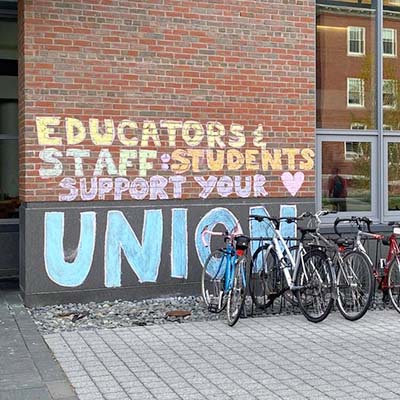Bargaining News
|March 10, 2023
Bates College seeks to defy law, prevent union election ballots from being counted

LEWISTON, ME — Fourteen months ago, adjunct faculty and staff at Bates College in Lewiston, Maine cast their ballots in a union election to join the Maine Service Employees Association (MSEA-SEIU Local 1989). Incredibly, due to legal challenges by the college administration, those ballots have yet to be counted. Although the rule allowing Bates to force the impounding of workers’ ballots has recently been rescinded and declared illegal, the College is continuing to argue for further delays to workers’ vote count.
According to Jeffrey Neil Young, an attorney with Solidarity Law who represents the union, the ballots have not been counted due to an 2019 rule promulgated by the National Labor Relations Board. That rule allowed employers like Bates College to prevent ballots from being tallied by filing a timely request to challenge the make-up of the bargaining unit following a decision directing the election. In December of 2021, Bates College filed a challenge to the NLRB Regional Director’s decision that approved a wall-to-wall bargaining unit. Bates’s challenge argued that adjunct faculty and staff should not be allowed to form a union together. This challenge led to the impoundment of workers’ ballots under the 2019 rule. This rule has now been deemed illegal and a violation of workers’ rights under labor law.
The rule, known as the “impoundment rule,” was recently declared to be illegal by a U.S. Court of Appeals in Washington, DC. The NLRB has decided not to appeal the ruling. In compliance with the Appeals Court’s order, the NLRB today rescinded the rule, prompting MSEA and Bates workers to request that the ballots at long last be counted.
Although it is now apparent that the ballots should have been counted 14 months ago, Bates is still seeking to prevent the ballots from being tallied. In opposition to the workers’ request to finally count the ballots, Bates opposed that request, claiming that doing so “may well cause confusion for employees and the Employer.” In fact, prior to the illegal promulgation of the 2019 impoundment rule, such votes were routinely counted regardless of challenges to the unit composition. Young declared, “Apparently Bates, an esteemed institution of higher learning, is incapable of understanding and applying the law. Employees were not confused before, and they won’t be confused now. It is demeaning that Bates has so little faith in its employees’ abilities to understand the law.”
“It’s been more than a year since Bates employees voted on our unionization drive and yet we still don’t know the outcome of the election,” said Aaron Morse, Associate Athletic Communications Director at Bates. “This is ridiculous. The courts have made it clear that our votes should be counted in a timely manner, yet the college continues to delay and stall and delay and stall. Why? What are they afraid of? Count the votes!”
Darlene Zupancic, Communication and Employment Coordinator at Bates Dining and member of the Bates Educators and Staff Organization’s organizing committee said, “It’s high time to count the ballots and determine if we won our union election. The newly appointed President, Garry Jenkins, has pledged to work closely with Bates staff and faculty. Bates has the opportunity to repair their relationship with workers. Given this recent objection from the current administration, it’s imperative that President Jenkins brings a new direction to labor relations on campus and works with us in good faith.”